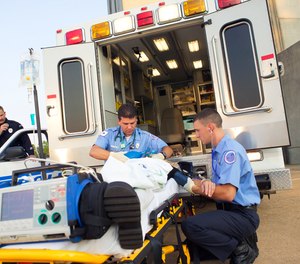
Eligible regional activities under AFG are Vehicle Acquisition, Training, Equipment, Wellness and Fitness, and PPE activities
The Assistance to Firefighters Grant Program (AFG) allow fire departments and nonaffiliated EMS organizations the opportunity to apply for grants utilizing a regional approach for their project. Eligible EMS regional activities under AFG are Vehicle Acquisition, Training, Equipment, Wellness and Fitness, and PPE activities. A nonaffiliated EMS organization is an agency or organization that is a public or private nonprofit emergency medical service entity providing medical transport that is not affiliated with a hospital and does not serve a geographic area in which emergency medical services are adequately provided by a fire department
As EMS agencies try to determine whether a regional approach to their Assistance for Firefighters Grant application is the best route to take, it helps to start by focusing on what benefits your agency and region will experience should the grant be approved. Questions to consider include:
One of the questions I get asked the most about regional AFG grant applications is, “Do all departments in a regional application have to buy the same thing?” The short answer is yes. The objectives of the AFG program are laid out in the Notice of Funding Opportunity (NOFO). Those objectives are to provide critically needed resources that equip and train emergency personnel to recognized standards, enhance operational efficiencies, foster interoperability and support community resilience. It becomes difficult to foster interoperability and enhance operational efficiencies if departments are purchasing different types of equipment. FEMA made it easier for regional partners to understand when on page 69 of the 2020 AFG Notice of Funding Opportunity it clearly states, “To align with the stated program objective of fostering interoperability, departments and agencies party to regional applications must use the same vendor.”
The host and all partnering departments involved in a regional AFG grant application must develop and execute a Memorandum of Understanding (MOU) that details the host and individual partner responsibilities, the distribution of grant assets, the duties of all participants and their EIN numbers. If desired the MOU may contain other specifics related to the project. The MOU must be in place at the time the grant is submitted. If the project is funded by FEMA, the MOU survives the application and is used as the guidance document for the participating departments. If the grant application is rejected, the MOU ceases to be in force.
All partnering departments must be in good standing and must be compliant with AFG Program requirements, including being current with past grants, closeouts and other reporting requirements. The host department should verify that all participating agencies meet these criteria before the application is submitted.
All partnering departments should read and review the regional application before it is submitted. Similarly, participating departments should read and agree with everything contained in the MOU before they sign it. It is too late to make changes to either one of these documents once the grant is awarded. Far too often, participating departments don’t realize until after the award is made that the operation, administration and procurement connected to the grant is the sole responsibility of the host. A NAEMS organization that serves as a host regional applicant can only host other NAEMS organizations.
Copyright © 2025 EmsGrantsHelp.com. All rights reserved.
